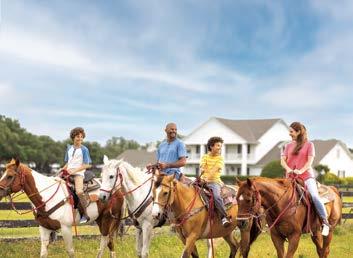
3 minute read
FINDING OUT ABOUT FOOD CO-OPS
WHAT ARE THEY AND HOW DO THEY WORK?
From cotton gins and grain elevators to dairy co-ops like Organic Valley and juice co-ops like Ocean Spray, food co-ops have been around for hundreds of years, but they started to take shape more formally in the late 18th century. Yet, as our economic system has matured and people have moved from farms to cities and cities have expanded to suburbs and metroplexes, co-ops have not proliferated at the rate of other food businesses. The Austin Economic Development Department and its partners are working to change that dynamic.
Advertisement
Food co-ops are values-focused food businesses that practice cooperative principles, and they are powerful tools for building a more resilient and equitable food system. By providing benefits to consumers, autonomy and fair wages for workers, investment returns for owners and markets for local producers, co-ops can create sustainable businesses that benefit a variety of stakeholders within the communities they serve. Austin is home to several successful food system co-ops, each operating under a slightly different model.
The Central Texas Farmers Co-op is a producerowned and operated multi-farm community supported agriculture program. CSAs provide farmers with a more reliable revenue stream through subscription purchase, and consumers get the fresh, local produce and meat. There is a cost savings to the consumer given the direct-to-consumer nature of this type of arrangement, fewer fossil fuels are needed to get the product to the consumer and the consumer benefits from high quality produce from a small farmer focused on regenerative practices and seasonal produce.
Black Star Co-op is a consumer-owned brew pub with democratic worker-management. This means that the workers at Black Star Co-op have a say in how the business is run. The resulting autonomy incentivizes workers to pay greater attention to all aspects of the business instead of limiting their focus to the one position they occupy. Among other benefits, this model provides a training ground for employees to learn entrepreneurship. The consumer ownership aspect of this model means that customers are more likely to support the business because they have an equity stake, which offers a small investor the opportunity to own a business with less risk and fewer downsides.
Wheatsville Food Co-op is a consumer-owned grocery and deli that has been a fixture in Austin for more than 40 years. Grocery co-ops provide a wide variety of locally sourced products, including produce, meats, dairy, grocery items and baked goods. By supporting local producers, grocery co-ops help to build a more sustainable food system in a given place. Food deserts are a real and persistent problem for both urban and rural areas of our country: co-ops can be a solution in those places making them indispensable to the people they serve. Not only are they a source of food, a basic need, but they become a mechanism for keeping dollars circulating in those communities and provide good paying jobs to residents.
For a deeper dive into the benefits of food co-ops, the Austin Co-ops Project is hosting a webinar on July 19 titled "Co-ops and the Food System." Presented by Annelies Lottmann from the University of Texas Rio Grand Valley Texas Rural Cooperative Center and Drew De Los Santos from the Austin Cooperative lists upcoming trainings and bilingual webinars on all types of co-ops.
In the meantime, visit a local co-op today and get to know the people who are keeping it local!
Business Association, their knowledge on the topic is both broad and deep. Lottmann exudes passion for co-ops that coexists with a deep understanding of the business end, “Co-ops offer a people-centered alternative to traditional business models. When we work together, we can create strong, resilient Austin food businesses that are great places to work and serve the needs of our community.”
If you’re ready to jump into the world of food co-ops and want more information, be sure to take advantage of the resources included here. The webinar, which is free of charge, also offers additional no-cost resources for class participants who are ready for the next step: launching a co-op. Additional training and consulting will be made available by UTRGV as the lead organization, Austin Cooperative Business Association and Nill Consulting. For more about co-ops of all kinds, visit Austin Cooperative Business Association’s website at acba.coop. Their events page
City of Austin & Texas Rural Cooperative Center

Present July Virtual Community Class
• Introduction to the cooperative movement and economy
• Deep dive into food system co-op success stories

• Practical tools to make even traditional food businesses more fair, democratic, and just
• Basics to starting a food system co-op

Class attendees will have the opportunity to schedule FREE coaching and consulting with the instructor and other co-op experts. Este webinar es gratuito y se presentará en inglés con interpretación al español. This webinar is free and will be presented in English with Spanish language interpretation. To register for the class, visit acba.coop/events.
For more information on organizations that support co-op businesses visit:
• utrgv.edu/sara
• acba.coop
• nillconsulting.com
• austintexas.gov
To register, scan the code:







